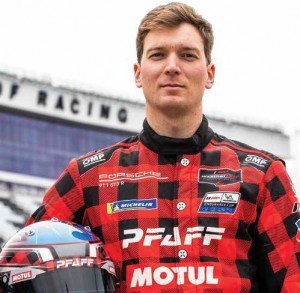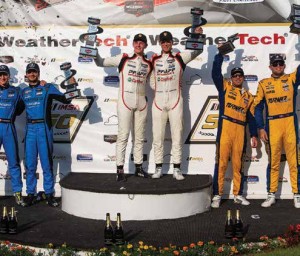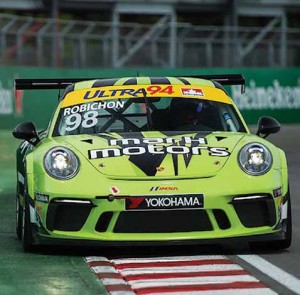Mainstreeter Staff
“I am nowhere near ready to stop pushing to reach my goals”
In this installment of our Sharing Lunch With interview, we talk with one of the most famous race car drivers in Canada that you have almost certainly never heard of! Unlike well-known Formula 1 race drivers like Lewis Hamilton or Canadian Lance Stroll, 28-year-old Zacharie Robichon, a native of Old Ottawa East (OOE) who grew up on Brown Street, does his racing on the Endurance Sports Car racing circuit which was portrayed recently in the film “Ford vs Ferrari”. A member of Pfaff Motorsports Team Porsche, Robichon has already garnered 38 victories and 55 podium finishes and has taken the prestigious pole position at the recent 24 Hours of Daytona race at the famed Daytona Speedway.

Pictured here at Daytona Speedway, Robichon and his Pfaff Motorsports team took the pole position at the famed 24 hour endurance race. Photo by Lessen Photo
With university business degrees in economics and finance, Robichon has used his academic background to diversify his racing career through his association with Porsche Canada. However, his childhood dream of racing fast cars continues to push him forward to the global pinnacle of endurance racing, the 24 Hours of Le Mans, France, arguably the most famous car race in the world. We asked Zacharie about his childhood in Old Ottawa East, his experiences climbing the ranks of professional racing and whether the COVID-19 pandemic has changed his fast-paced lifestyle.
THE MAINSTREETER: Zach, I understand that your father raced during your early childhood. Can you explain how and when your passion for car racing developed?
ROBICHON: Without a doubt, I can say with 100% certainty that my passion for car racing growing up came from my dad. One of my earliest memories, and probably the earliest memory of anything car-related, would have been in 1997 when Jacques Villeneuve, a Canadian race driver, won the Formula 1 World Championship. I was five years old at the time, and I can recall waking up early on Sunday morning with my dad to watch those Formula 1 races. My dad got back into racing, having previously taken a step back when my sister was born, when I was 4 or 5. I watched him racing, and that extended my interest. You know, everybody wants to be like their dad in a way, and when I saw my dad racing, it definitely inspired me about the sport. I started racing when I was 13. That passion has never disappeared.
My mom always tells the story of me as a young kid. I was three years old, and we’d go to a coffee shop and I would watch all the cars going past the shop and I could name what kind of car they were. I could barely talk, but I knew what kind of car all of our neighbours drove. It’s always been something that I’m passionate about, and I’m lucky enough now to make a living from doing what I love.
THE MAINSTREETER: What kind of racing did your father do?
ROBICHON: He started racing before I was born. He raced small Formula cars in the 70s and 80s, and actually, in 1989, he was driving in a race and my mom was working in the pit crew. After the race, she told my dad and the rest of the pit crew: “Hey, by the way, I’m pregnant”, and that was with my sister. He stopped racing at that time and then, on his 40th birthday, for his midlife crisis, let’s call it, instead of buying a sports car, he bought himself a go-kart and went racing near Montreal.
THE MAINSTREETER: And I believe you also began with go-karts. Can you describe kart racing for our readers?
ROBICHON: Sure, just think of a go-kart you can rent, one that you go drive with your kids, where the karts travel at 30 kms/hr. The karts we race look similar to that, but instead of going 30 kms/hr they go 130 kms/hr. The ones the public rents have all kinds of plastic bodywork around them, but our race karts are much lighter. A good modified racing kart has a powerful two stroke engine – 125 cc – and it goes from zero to 100 kms/hr in about four seconds. So, they’re fast.
THE MAINSTREETER: What was the next level of racing for you after you graduated from go-karts?
ROBICHON: After kart racing, I started driving in what’s called the Formula 1600 or Junior Formula class. It’s actually the same class that my dad raced in the 1980s. It’s the natural stepping stone to entry-level car racing since you go from a modified go-kart into a full car.
When the time was right, by 2013, my dad said we could try Junior Formula for one year because it’s more expensive. After that, we agreed that I was on my own to figure out how to continue racing, and how I was going to get sponsors. I ended up racing in that series for three years. Luckily, for the second year, I was able to find a few sponsors and by the third year, I ended up actually working for the team. I was racing, but also working as an engineer and as a mechanic. On race weekends, when I wasn’t racing, I would help the other drivers, because I’d already been there for three years and I had won a lot of races. So, that’s how I got my career going.

Zacharie Robichon (center right) and his teammate Dennis Olsen (centre left) of Norway celebrate a victory at the IMSA WeatherTech GTD championship at Lime Rock Park in Connecticut July 2019. Photo by Lessen Photo
THE MAINSTREETER: Was it very challenging for you to go from kart racing to Junior Formula or was it sort of a natural step?
ROBICHON: It’s kind of a natural progression. The biggest challenge when you go from the go kart to the car racing is dealing with the weight of the car. When you’re driving a go kart, with me in it, it weighed less than 400 pounds. Now all of a sudden, you’re dealing with a car and while it’s still light, about 1500 pounds, it is four times the weight of what you’re used to.
Although the speed is physically much higher, with possibilities of upwards of 230 kms/hr, everything actually happens slower than in a kart because the car is so much heavier. That’s the biggest challenge when you go from a nimble little go kart to heavier race cars. Everything happens more slowly than what you’re expecting, even though you are going 100 kms/hr faster. You actually have to think slower, relax more and let the car move around.
THE MAINSTREETER: When you were young, did you ever have any doubts that this was what you really wanted to do as a career, or has it always been clear to you?
ROBICHON: Honestly, I think the reason why I have been successful is because I never actually thought I would make it a career. When I was a kid, I loved it, and obviously, I wanted to race. I wanted to become a professional. But there’s also a big financial hurdle involved with it, and I knew that as soon as I started. So, for me, it was just something that I enjoyed doing, so I never actually put all that much career pressure on myself.
At the time, I was also still ski racing and that was very much my main focus at that age. The karting was fun, and it was my release from the ski racing. I think it actually helped my development because I didn’t put that extra pressure on myself. And even now that I have made a career out of car racing, I still have that same mentality. I always strive to think that I’m here because I’m having fun, and not necessarily because I have to be here to make a living.
THE MAINSTREETER: You said that there are a couple of things that make it too real. Are you by chance thinking of crashes and possible injuries?
ROBICHON: I think to be to be successful you can’t think of those things – obviously sometimes things happen. I’ve had a couple of relatively big accidents, but luckily I was unhurt. You can’t think of that as a deterrent to driving. At the end of the day, you are not the only person who’s deciding whether or not you’re going to be able to succeed. It’s much like a hockey player – if they get hurt, it’s out of their control and it might derail their career. Because car racing is such an expensive sport, you’ve got all these sponsors and you get reminded every now and then that you don’t have the final decision on whether or not you’re going racing that day. Sometimes that can become a little confusing and frustrating, but it’s also the nature of the sport. The drivers are often the last people to know what’s going on and sometimes it’s a little overwhelming.
THE MAINSTREETER: From the Junior Formula circuit, what was the next step up the ladder for you?
ROBICHON: So, after three seasons of Junior Formula car racing, I needed to find something else. Sports car racing seemed like the obvious way to go. I made the switch to sportscar racing because there’s a lot more manufacturer involvement, so it’s much easier to get sponsorship. If I drive a Porsche, and although it’s not the streetcar, it still looks like the streetcar. You can go to a sponsor and say: Hey, I’ll have your name on a Porsche, and they know what that is, and they think that’s cool.
There was a race series in Canada called the Porsche GT 3 Canada Cup, and all the Porsche dealerships across the country were fielding teams in this series. I was very fortunate to meet with Mark Motors on Montreal Road in Ottawa. It was pure luck. I was coaching at the racetrack, and they asked if I wanted to drive a car. I was, like, “who doesn’t want to drive a Porsche?” I’d never even been in a Porsche in my whole life, and here I was about to get into a Porsche race car. I jumped in, did 10 laps and it all kind of started there. After that, I was introduced to Michael and Liza Mrak, the owners of Mark Motors, and they very kindly gave me my opportunity to race Porsches. I spent three great seasons, 2016 to 2018, racing with Mark Motors in Canada in the Porsche GT3 series.
THE MAINSTREETER: How successful were you with that team?
ROBICHON: There were 12 races a year. We finished third in 2016, second in 2017, and we won the championship in 2018. We had a very good three years together. In total, I believe we won 15 races, and I think we had 35 podiums.
THE MAINSTREETER: That takes us to 2018, and you move from Mark Motors to another team, and a different class of racing, correct?
ROBICHON: When I raced with Mark Motors, everybody I raced against drove the same Porsche car. After I won that, I moved up to the pinnacle of sports car racing – endurance racing – which is 24 hours, 12 hours or six-hour races, and you race with a team against other manufacturers’ cars – Ferraris, Lamborghinis, Audis, Mercedes, and others. I had the opportunity to join Pfaff Motorsports, a team based in Toronto associated with Porsche.
THE MAINSTREETER: Let’s pivot to the present day. Tell me about COVID-19 and how life has changed for you and your family?
ROBICHON: I’ve been lucky. Myself, my family, my girlfriend and all of her family, we’ve all been very healthy. My girlfriend and I have been living at my parents’ cottage at Mont Tremblant since March. We have a condo in Montreal, but we figured the best and safest place to be was at the cottage away from the cities.
I started working again in June. On top of the racing, I also own an event management company that runs all the events for Porsche in Canada. So, for any event that involves the Porsche car that’s owned by Porsche Canada, my team of 30 staff is involved – we do driving experiences for Porsche owners, we teach people how to drive on the racetrack, and we teach people how to safely drive on ice. And, since June, we’ve spent a lot of time putting together new protocols to be able to run our events in COVID-19 times.
THE MAINSTREETER: Still on the COVID crisis when things stabilize, do you think you still have the drive to get behind the wheel and continue your racing career?
ROBICHON: I think if this forced break has taught me anything, it showed me how much I still love racing, and that I am nowhere near ready to give up pushing to reach my goals and continue my life as a race car driver.
My first big life goal as a driver was accomplished in 2019 and 2020 when I raced in the 24 Hours of Daytona at the Daytona International Speedway, which is America’s toughest endurance race and arguably the second biggest endurance race in the world, next to the 24 Hours of Le Mans in France.
Le Mans has always been regarded as the biggest sports car race in the world. Anyone who has seen the Ford vs Ferrari movie will know the big race there is based on the Le Mans endurance race, so that remains my biggest career goal, and the next step that I’d like to take. And if you watch that movie, every other race they feature when they show the build-up to the finale, well, I’ve actually done all those races, so it’s just that one big one that our Pfaff Motorsports team hasn’t done yet.
THE MAINSTREETER: We started off talking a little about your folks and the kind of support they’ve given you. Let’s conclude with your mom and dad.
ROBICHON: Really, none of what I have done could have been done without them. Financial support is one thing, but it takes so much more support to enable this kind of success. My mom, she’s about to throw up every time I’m on the track, but that doesn’t stop her from coming to a lot of races and supporting me.
My dad obviously loves racing. I spend three or four hours with him after races he attends just talking about the race. He will re-watch it five times and tell me things about what happened that I don’t know because when I’m driving I’m focused on myself. And with my mom, it’s just very special – no matter what I do, I know that, whether she likes it or not, she’ll be there to support me.
In our next issue, we interview Canadian international cyclist, Michael Woods, who took the sport’s bronze medal at the 2018 World Championships. Woods, who grew up in Old Ottawa East, is considered to be one of the foremost hill climbers in all of cycling. He is currently under contract to team up with four-time winner Chris Froome in next year’s Tour de France.







